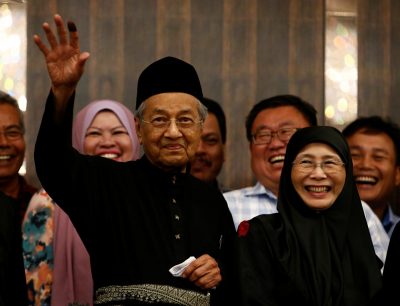The first of these claims is difficult to argue against. Large-scale affirmative action for Bumiputras was launched after the traumatic race riots of 1969, with a view to giving the mostly rural and poor Malay community a stake in the growing post-independence economy. Since then, as Jayant Menon writes, the scorecard shows that ‘most Bumiputras have not realised much benefit from [the affirmative action scheme] — but a very small minority have enjoyed superlative gains’. While poverty and underemployment remain a stubborn problem in the Malay community, politically-connected Bumiputra entrepreneurs have prospered off state patronage.
There are signs that the second of these assumptions — that it is politically too difficult to substantially reform the Bumiputra policy — will soon be tested.
As Donald Horowitz highlights in this week’s lead essay, reforming the affirmative action system is one entry on the long to-do list of reforms that the new government confronts. Many of the broader institutional reforms Horowitz canvasses — from cleaning out corrupt state bureaucracies to rehabilitating political institutions such as the Parliament and the judiciary — will certainly sap the new government’s reserves of political capital as recalcitrant officials obstruct change. But the government goes into these fights with the public on its side: disgust at the perceived corruption of the previous UMNO government, after all, helped deliver victory to Pakatan Harapan in May’s election.
Things get stickier, politically-speaking, when the focus shifts from practical governance questions to the highly vexed issues of race and religion. The later decades of UMNO rule saw the expansion and empowerment of an Islamic bureaucracy and court system charged with enforcing those elements of sharia law that are applied in Malaysia. Horowitz writes that as much as this process has aided the erosion of the freedoms of Muslims and non-Muslims alike, tackling the excesses of the Islamic authorities invites accusations that the new government is hostile to religious values.
The government does appear to be laying the groundwork for reforming the equally contentious Bumiputra policies. Last week, a Council of Eminent Persons — a panel of technocrats appointed by the government to advise it on how to put its reform promises into practice — delivered its recommendations to the Pakatan Harapan government. It contains a proposal to shift the current system of race-based affirmative action to one that is means-tested and targeted on the basis of socio-economic status.
In this task, the new government faces a potentially more challenging set of stakeholders to win over: the voters. There are widespread and deeply held beliefs in the Malay community that economic preferment is an entitlement befitting their status as the ‘original’ people of Malaysia and that the maintenance of such favouritism is essential to their participation in the economy on equal terms.
As Horowitz emphasises, ‘only about 30 per cent of Malays voted for Pakatan candidates, and the now opposition Barisan Nasional received almost no votes from non-Malays.’ At every turn, the government must be ready to be accused of betraying Malay interests by the UMNO opposition, which has calculated that strident appeals to ethnic and religious chauvinism are the easiest path back to power.
With this in mind, the government will likely determine that incremental reforms to the racial preference system — towards the goal of renovation rather than abolition — are the only politically viable option. Observers expecting more dramatic change than this must control their expectations; even the technocrats within the government understand that policy must reflect what Menon describes as the ‘delicate balance between society and meritocracy’ that prevails in Malaysia.
There are few politicians better placed to make headway in reforming the affirmative action system and curbing the excesses of the Islamic authorities than current Prime Minister Mahathir Mohamad. Mahathir, who rose to political prominence as a champion of Malay privileges, has the credibility within the Malay heartland that many of his more liberal Malay partners lack. Recalling the old observation that ‘only [Richard] Nixon could go to China‘, Mahathir might well have his Nixon-in-China moment and, in doing so, pave the way for a fairer society and more dynamic economy.
The EAF Editorial Board is located in the Crawford School of Public Policy, College of Asia and the Pacific, The Australian National University.

